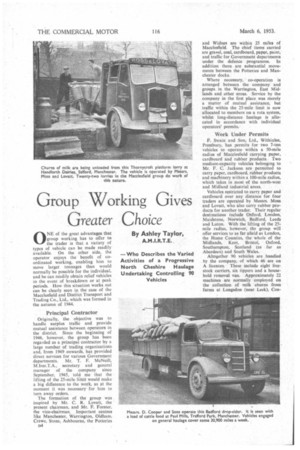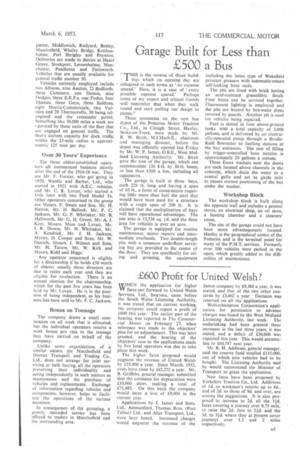Group Working Gives
Page 44

Page 45

If you've noticed an error in this article please click here to report it so we can fix it.
Greciter Choice By Ashley Taylor, A.M.I.R.T.E. 0 NE of the great advantages that group working has to offer to the trader is that a variety of types of vehicle can be made readily available. On the other side, the operator enjoys the benefit of coordinated working, enabling him to move larger tonnages than would normally be possible for the individual, and he can readily obtain relief vehicles in the event of breakdown or at peak periods. How this situation works out can be clearly seen in the case of the Macclesfield and District Transport and Trading Co., Ltd., which was formed in the autumn of 1944.
Principal Contractor Originally, the objective was to handle surplus traffic and provide mutual assistance between operators in the district. Since the beginning of 1946, however, the group has been regarded as a principal contractor by a large number of trading organizations and, from 1949 onwards, has provided direct services for various Government departments. Mr. T. F. McNeill, M.Inst.T.A., secretary and general manager of the company since September, 1945, told me that the lifting of the 25-mile limit would make a big difference to the work, as at the moment it was necessaryfor him to turn away orders.
The formation of the group was inspired by Mr. C. R. Lovatt, the present chairman, and Mr. F. Forster, the vice-chairman. Important centres like Manchester, Warrington, Oldham. Crewe, Stone, Ashbourne, the Potteries D4 and Widnes are within 25 miles of Macclesfield. The chief items carried are gravel, coal, cardboard, paper, paint,' and traffic for Government departments under the defence programme. In addition there are substantial movements between the Potteries and Manchester docks.
Where necessary, co-operation is arranged between the company and groups in the Warrington, East Midlands and other areas. Service by the company in the first place was merely a matter of mutual assistance, but traffic within the 25-mile limit is now allocated to members on a rota system, whilst long-distance haulage is allocated in accordance with individual operators' permits.
Work Under Permits
F. Swain and Son, Ltd., Withinlee, Prestbury, has permits for two 7-ton 'vehicles to operate within a 50-mile radius of Macclesfield carrying paper, cardboard and rubber products. Two medium-capacity vehicles belonging to Mr. F. C. Jackson are permitted to carry paper, cardboard, rubber products and machinery within a 100-mile radius, which takes in most of the north-west and Midland industrial areas.
Vehicles restricted to carry paper and cardboard over any distance for four traders are operated by Messrs. Moss and Lovatt, who also carry rubber products for another trader. Their regular destinations include Oxford, London, Maidstone, Norwich, Bedford, Leeds and Luton. With the lifting of the 25mile radius, however, the group will offer services to as far afield as London, the Home Counties, the whole of the Midlands, Kent, Bristol, Oxford, Southampton, Scotland (as far as Aberdeen) and South Wales.
Altogether 90 vehicles are handled by the company, of which 46 are on A licences. These include eight livestock carriers, six tippers and a household removal van. Approximately 22 machines are normally employed on the collection of milk churns from farms at Longsdon (near Leek), Con gleton, Middlewich, Ruelyard, Bosley, Macclesfield, Whaley Bridge, Kettlesshulme, Pott Shrigley and Poynton. Deliveries are made to dairies at Hazel Grove, Stockport, Levenshulme, Manchester, Pendleton and Failsworth. Vehicles that are usually available for general traffic number 30.
Vehicles currently employed include two Albions, nine Austins, 22 Bedfords, three Commers, one Dennis, nine Dodges, three E.R.F.s, one Foden, four Thames, three Guys, three Seddons, eight Morris-Commercials, two Vu!cans and 20 Thornycrofts, 30 being oilengined and the remainder petrol. Something like 30,000 miles a week are operated by those units of the fleet that are engaged on general traffic. The fleet's current capacity for dock traffic within the 25-mile radius is approximately 125 tons per day.
Over 30 Years' Experience The three oldest-established operators all commenced business shortly after the end of the 1914-18 war. They are Mr. F. Forster, who got -going in 1920, Wardle and Barber, Ltd., who started in 1921 with A.E.C. vehicles, and Mr. C. R. Lovatt, who started a little later with two Ford Model Ts. Other operators concerned in the group are Messrs. F. Swain and Son, Mr. H. Hatton, Mr. H. Bullock, Mr. F. C. Jackson, Mr. G. P. Whittaker, Mr. B. Hal!worth, Mr. G. H. Green, Mr. A. J. Kent. Messrs. Moss and Lovatt, Mr. J. R. Dowse, Mr. H. Whittaker, Mr. A. Kendrick, Mr. J. H. Jackson, Messrs. D. Cooper and Sons, Mr. W. Daniels, Messrs. J. Wilmot and Sons, Mr. H. Tatton, Mr. W. Kirk and Messrs. Kidd and Higgs.
Any operator concerned is eligible for a directorship if he holds £50 worth of shares; usually three directors are due to retire each year and they are eligible for re-election. There is an annual election for the chairmanship, which for the past five years has been held by Mr. Lovett. He is in the position of being independent, as his business has been sold to Mr. F. C. Jackson.
Bonus on Tonnage The company draws a small commission on all work that is allocated, but the individual operators receive a work bonus pro rata to the tonnage they have carried on behalf of the company.
Unlike some organizations of a similar nature, the Macclesfield and District Transport and Trading Co., Ltd., does not arrange for joint servicing or bulk buying, all the operators preserving their individuality and acting independently in such matters as maintenance and the purchase of vehicles and replacements. Exchange of information regarding vehicles and components, however, helps to facilitate the operations of the various members.
In consequence of the grouping, a greatly extended service has been offered to traders in Macclesfield and the surrounding area.
































































































